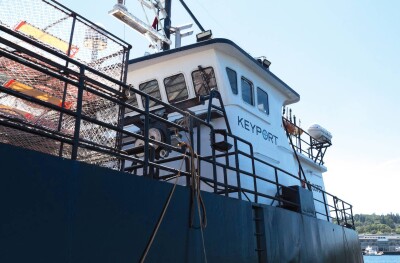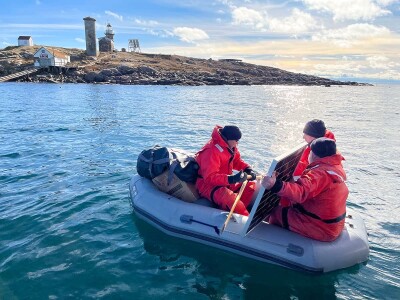The vice presidential seal
By the time most of you read this, we'll know whether Vice President Dick Cheney showed up for a July 31 congressional hearing to look into the role he may have played in the development of a 10-year water plan for the Klamath River in California and Oregon.
Historically the Klamath is one of the West's great salmon rivers, producing both chinook and cohos, and once produced as much as 33 percent of the salmon caught on the West Coast. However, the construction of dams along the river during the 20th century put paid to much of the fish production.
The dams remain an issue with fishermen, Native Americans and conservationists lobbying for their removal, and the river's coho salmon are listed as threatened under the Endangered Species Act.
The dams are also an issue for farmers and ranchers in this arid neck of the woods, because they facilitate irrigation, and for power companies like PacifiCorp (owner of four dams, and owned itself by billionaire and reputed good guy Warren Buffett) that use them to generate electricity.
In 2001, the Washington Post reported this summer, Cheney telephoned the mid-level bureaucrat at the Department of the Interior who he understood was "handling this Klamath situation."
The situation was this: Because of a drought, the government was preparing to divert water from irrigation to river flow to protect cohos and suckerfish (whatever they are), consistent with the ESA.
Said the Post: "Farmers and their families, furious and fearing for their livelihoods, formed a symbolic 10,000-person bucket brigade. Then they took saws and blowtorches to dam gates, clashing with U.S. marshals as water streamed into the canals that fed their withering fields, before the government stopped the flow again."
Cheney, who supported the farmers politically and philosophically, had a couple of options: He could elicit a cabinet-level determination that the economic hardship to farmers outweighed the benefit of protecting the fish — which would have put the administration in the hot seat — or he could produce some "sound science" in favor of opening the irrigation spigot.
(Where would we be without sound science, what with all the junk science that's out there today!)
If you are Joe Blow lobsterman in East Overshoe, Maine, and they jam you with the Endangered Species Act, you stay jammed.
But if you're vice president, you call the National Academy of Sciences and say, "Boys, you better take a look at that report by NMFS," and they say, "Will do, Mr. Veep," and before you know it they issue a finding that "there is no substantial scientific foundation" for denying the farmers irrigation water.
Based on the NAS findings, the Interior Department's Bureau of Reclamation, which oversees water projects and operates 58 power plants in the West, submitted a 10-year plan assuring the farmers of more water.
Subsequent events, however — such as the deaths of 77,000 salmon attributed to low water — have undermined the NAS report, and two federal courts have disparaged it as well, with a judge prohibiting diversion for irrigation when water is low. In addition, NMFS' lead biologist in the affair quit the agency, which he says went in the tank on the issue, the Post reported.
The fishery was declared a disaster last summer, and Congress ponied up a $60 million aid package for fishermen who couldn't fish, which came on top of $15 million that farmers were paid not to farm.
Oh what an expensive web we weave...
This issue illustrates the lawyer's old maxim that hard cases make bad law. Clearly, farmers and ranchers were in a position that was as unenviable as the fishermen's, and theoretically, they were as powerless. What makes the blood boil, of course, is our perception that fishermen — and fish — were fighting a stacked deck.
But stacked decks are nothing new to this industry.
If I were a gambling man, I wouldn't bet a lot of money that Cheney will show up for the hearing. An inquisition attended by junior congressmen from blue states would not be the great man's idea of a good time.
His modus operandi is working behind the scene. I don't think he shrinks from showdowns, but he displays the more practical — as far as he's concerned — viewpoint that if it's not going to do him any good, why waste the time? For that matter, what good would it do us? Does anyone think the Dick Cheney we know and love is going to sit there and squirm?
We would be far better off internalizing the lesson of how realpolitik works so we can make it work for us. We should understand the importance of alliances based on issues, not inclinations. And while we should always aspire to do the right thing, we should never count on the other guy to do it.
— Jerry Fraser






